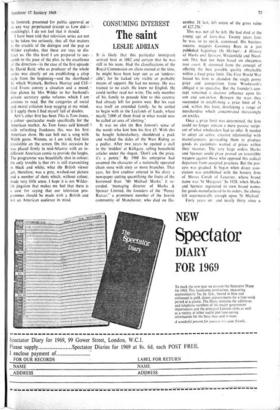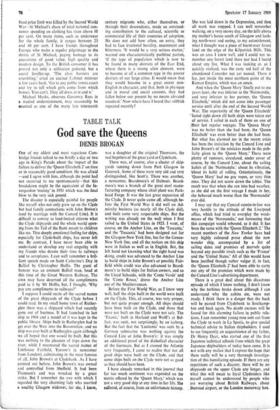The saint
CONSUMING INTEREST LESLIE ADRIAN
It , is likely that this particular immigrant arrived here in 1882 and certain that he was still in his teens. Had the classifications of the Royal Commission on aliens existed at the time, he might have been. kept out as an 'undesir- able% for he lacked -any visible or probable means of support. He had-no money. He was trained to no craft. He knew no English. He could neither read nor write. The only member of his family to precede him to this country had already left for points west. But his race was itself an extended family. So he settled to begin with in the Leylands of Leeds, where nearly 7,000 of them lived in what would now be called an area of 'clotting.'
It was no clot (in Ben Jonson's sense of the word) who lent him his first £5. With this he bought haberdashery, shouldered a pack and walked the dales of the West Riding as a pedlar. After two years he opened a stall in the 'midden' at Kirkgate, selling household articles under the slogan, 'Don't ask the price. it's a penny.' By 1908 his enterprise had assumed the character of a nationally operated chain store with sixty or more branches. That year, his first creditor entered in his diary a newspaper cutting quantifying the fruits of the borrowed fiver. 'Mr Michael Marks,' it re- corded, 'managing director of Marks & Spencer Limited, the founders of the -Penny Bazaar," a prominent member of the Jewish community of Manchester, who died on De-
cember 31 last, left estate of the gross value of f27,256.'
This was not all he left. He had died at the young age of forty-five. Twenty years later he was, so to speak, canonised. His business success, suggests Goronwy Rees in a just published hagiology (St Michael : A History of Marks and Spencer, Weidenfeld and Nicol- son 50s), had not been based on cheapness tout court. It stemmed from the concept of offering the best possible quality obtainable within a fixed price limit. The First World War forced his firm to abandon the single penny price and competition from Woolworth's obliged it to specialise. But the founder's con- cept remained a decisive influence upon his son and son-in-law. Between the wars they succeeded • in establishing a price limit of 5s and, within this limit, developing a range of merchandise which concentrated increasingly on textiles.
Once a price limit was determined, the firm could no longer remain a mere passive recipi- ent orwhat wholesalers had to offer. It needed to adopt an active, creative relationship with manufacturers, persuading them to produce goods its customers wanted at prices within their incomes. The very large orders Marks and Spencer could place proved an irresistible weapon against those who opposed this radical departure from accepted practices. But the pro- cess was gradual. It began when direct asso- ciation was established with the hosiery firm of Messrs Corah of Leicester, whose brand name was `St Margaret.' In 1928, when Marks and Spencer registered its own brand names for goods manufactured to its orders, the choice fell supernaturally enough upon 'St Michael.'
Forty years on and nearly thirty since a
fixed price limit was killed by the Second World War—St Michael's share of total national con- sumer spending on clothing has risen above 10 per cent. On many items, such as underwear for the whole family, it ranges between 25 and 40 per cent. I have friends throughout Europe who make a regular pilgrimage to the shrine of St Michael, paying homage to its guarantees of good value, high quality and modern design. To the British consumer it has proved not only a utilitarian godsend, but a social leveller-up. The class barriers are crumbling,' cried an excited Cabinet minister a few years back. `Go to any public tennis court and try to tell which girls come from which homes. You can't. They all dress at st and s.'
Michael Marks, observes Goronwy Rees in a studied understatement, may reasonably be counted as one of the many late nineteenth
century migrants who, either themselves, or through their descendants, made an outstand- ing contribution to the cultural, scientific or commercial life of their countries of adoption. He does not add how often, on entry, they had to face irrational hostility, resentment and bitterness. 'It would be a very serious matter,' warned one characteristically purblind patriot, 'if the type of population which is now to be found in many districts of the East End, where there is a strong alien element, were to become at all a common type in the poorer districts of our large cities. It would mean that they would become to a great extent non- English in character, and that, both in physique and in moral and social customs, they had fallen below our present by no means elevated standard.' Now where have I heard that rubbish repeated recently?



































 Previous page
Previous page